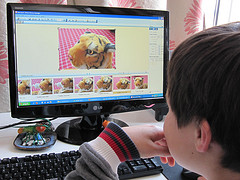Parents: Instead of Banning Your Kids from Social Networks, Consider Teaching Responsible Usage
“There is absolutely no reason for any middle school student to be a part of a social networking site.”
These were the words of Anthony Orcini, the principal of Benjamin Franklin Middle School in Ridgewood, New Jersey. They were included in an e-mail he sent to parents at the end of April, urging them to immediately ban their children from using any social network. Lou Young of WCBS has the story and a full copy of the letter. This comes care of my friend James Dasher.
I’m not wholly surprised by this e-mail, but was a little stunned by the wording of it. Personally, I don’t believe that this is the right course of action – not in general and not for all families. Certainly, parents have the right to block their children from using a social network and that may be the right choice for them. However, I question whether that choice should be made due to a forcibly written message by a school principal. I just hope parents don’t read this and make any rash decisions.
My Background
I’ve been using “social networks” regularly probably since I was 13 or 14, with some sporadic, irregular use before that. I was a moderator on someone else’s community around age 14 and I began managing my own communities at 15. So, I have somewhat of a unique perspective, I suppose. I’m 25 now.
I’m glad my parents didn’t ban me from them. I’m glad that my parents taught me basic principles to live my life by, principles that have served me both online and offline. They weren’t particularly tech savvy. They didn’t hover over me at all moments. The family computer (I didn’t have my own computer until I was almost 20) wasn’t locked down and it didn’t have any monitoring software. But, they taught me how to be safe as a kid.
The funny thing is, the internet isn’t all that different from … everything that isn’t the internet. When I was small, my parents instilled in me, very directly, that I was never to go anywhere with someone if they didn’t tell me that I could do so. I was never to give anyone I did not know my name, my address or any other information about me. And if anyone ever tried to take me anywhere, I was to scream as loud as possible.
The Lessons Live On
Of course, as we get older and we get into our teens and become young adults, these rules of life loosen, though they don’t disappear. To this day, I am careful about the type of situations that I place myself into and who I surround myself with and who I accept a ride from. I trace this back to those early lessons of safety.
These ideas were instilled in me before the internet was really a popular thing. But, by the time I got on it, I simply applied them to my web usage. I knew not to tell anyone where I lived, send them a picture of me, agree to meet anyone in person or go to any place by myself. I already knew.
That’s not to say I believe that 12-14 year olds today need to be on any social networks or that such use should be unrestricted. Not at all. They don’t need to be on them. My point is that that is a choice that each family needs to make, based on their situation.
At the same time, if they’re interested in social networks, I believe that teaching responsible use is the way to go. Banning them will just lead to more underground usage and make it a secret. Social networks aren’t inherently bad. Just like the world isn’t inherently bad. But, good lessons will lead to responsible uses now or in the future.
Good Ideas
That’s not to say Mr. Orcini’s e-mail doesn’t have some good ideas in it. Keeping a general eye on internet usage and text messages are good things to do. Keeping computers in a family space, where members of your family are always trafficking through, isn’t a bad idea, though he doesn’t come out and say that. Parental controls and filters are fine, too, though maybe not right for everyone.
While saying that social networks have “have an obligation to suspend accounts or they are liable for what is written,” is not technically accurate, reporting suspicious activity to the site makes sense. Just don’t expect to site (or me, as someone who runs social sites) to be responsible for your child.
Mr. Orcini even mentions education, as I have mentioned here – he just dismisses it.
Some people advocate that the parents and the school should teach responsible social networking to students because these sites are part of the world in which we live.
I disagree, it is not worth the risk to your child to allow them the independence at this age to manage these sites on their own, not because they are not good kids or responsible, but because you cannot control the poor actions of anonymous others.
Sooner or later, you’ll have to teach your kids responsible networking, “social” or not. And a big reason you do that, like my parents did, is the “poor actions of anonymous others.” The e-mail closes with an odd statement, of sorts, suggesting that families learn about cybersafety, but then do everything he says, regardless.
Learn as a family about cybersafety together at wiredsafety.org for your own knowledge. It is a great site. But then do everything I asked in this email – because there really is no reason a child needs to have one of these accounts.
I’m sure Mr. Orcini’s heart is in the right place. But, while principals may control your child’s schools, they don’t – or shouldn’t – control your home. Whether or not you “allow” your kids to visit social networks now, I’d definitely recommend that all parents lay the ground work for responsible networking – online and offline – long before it becomes a serious threat.


